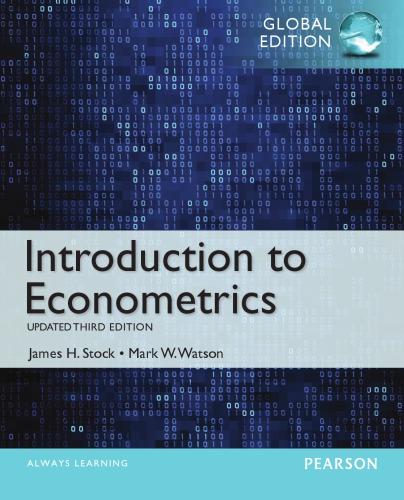E10.2 Do citizens demand more democracy and political freedom as their incomes grow? That is, is democracy
Question:
E10.2 Do citizens demand more democracy and political freedom as their incomes grow? That is, is democracy a normal good? On the textbook website, www.pearsonglobaleditions.com/Stock_Watson, you will find the data file Income_Democracy, which contains a panel data set from 195 countries for the years 1960, 1965, . . . , 2000. A detailed description is given in Income_Democracy_Description, available on the website.4 The dataset contains an index of political freedom/democracy for each country in each year, together with data on the country’s income and various demographic controls. (The income and demographic controls are lagged five years relative to the democracy index to allow time for democracy to adjust to changes in these variables.)
a. Is the data set a balanced panel? Explain.
b. The index of political freedom/democracy is labeled Dem_ind.
i. What are the minimum and maximum values of Dem_ind in the data set? What are the mean and standard deviation of Dem_ind in the data set? What are the 10th, 25th, 50th, 75th, and 90th percentiles of its distribution?
ii. What is the value of Dem_ind for the United States in 2000?
Averaged over all years in the data set?
iii. What is the value of Dem_ind for Libya in 2000? Averaged over all years in the data set?
iv. List five countries with an average value of Dem_ind greater than 0.95; less than 0.10; and between 0.3 and 0.7.
c. The logarithm of per capita income is labeled Log_GDPPC. Regress Dem_ind on Log_GDPPC. Use standard errors that are clustered by country.
i. How large is the estimated coefficient on Log_GDPPC? Is the coefficient statistically significant?
ii. If per capita income in a country increases by 20%, by how much is Dem_ind predicted to increase? What is a 95% confidence interval for the prediction? Is the predicted increase in Dem_ind large or small? (Explain what you mean by large or small.)
iii. Why is it important to use clustered standard errors for the regression?
Do the results change if you do not use clustered standard errors?
d. i. Suggest a variable that varies across countries but plausibly varies little—or not at all—over time and that could cause omitted variable bias in the regression in (c).
ii. Estimate the regression in (c), allowing for country fixed effects.
How do your answers to (c)(i) and (c)(ii) change?
iii. Exclude the data for Azerbaijan and rerun the regression. Do the results change? Why or why not?
iv. Suggest a variable that varies over time but plausibly varies little—or not at all—across countries and that could cause omitted variable bias in the regression in (c).
v. Estimate the regression in (c), allowing for time and country fixed effects. How do your answers to (c)(i) and (c)(ii) change?
vi. There are addition demographic controls in the data set. Should these variables be included in the regression? If so, how do the results change when they are included?
e. Based on your analysis, what conclusions do you draw about the effects of income on democracy?
Step by Step Answer:

Introduction To Econometrics
ISBN: 9781292071367
3rd Global Edition
Authors: James Stock, Mark Watson






